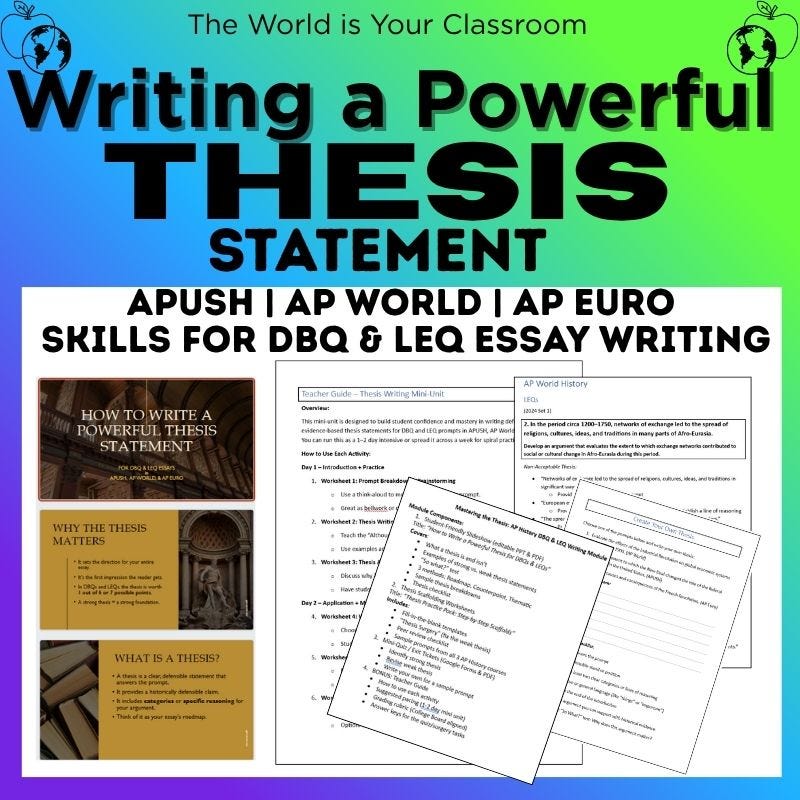Your Thesis: The Undisputed Backbone of Every Great Essay
Writing a great essay starts with a perfectly crafted thesis statement.
Think a thesis statement is only for your AP History class? Think again. A thesis statement is not just something that you write for your AP History essay. Any well-written essay or paper should have one. The College Board tells you right in their rubric what they expect from a thesis statement when they say, “Respond to the prompt with a historically defensible thesis or claim that establishes a line of reasoning.” The rubric further specifies, “To earn this point, the thesis must make a claim that responds to the prompt rather than restating or rephrasing the prompt. The thesis must consist of one or more sentences located in one place, either in the introduction or the conclusion.” In other words, in your essay, you are going to defend what you say in your thesis AND you are going to provide historical reasoning.
Historically Defensible
What does that mean? Simply put, first you’re making a claim that can be defended with historical evidence. Can someone disagree with your claim? Do you have evidence that will help you argue that you are right and they are wrong? Second, that evidence needs to be specific historical vocabulary or concepts that preview your argument. So, if the prompt asks: “Evaluate the extent to which you enjoyed your birthday,” your thesis would start out saying that your birthday was mostly miserable. Can someone argue that your birthday was a wonderful day. Yes? Of course.
Next, you need to include historical evidence that supports your misery. You might write about the weather being cold and rainy, that you were sick, and that your family argued during your party. The only bright spot was going to lunch with your BFF. So, in your thesis that started out with “my birthday was mostly a miserable day,” you’ll continue to say, “due to the bad weather, waking up with a cold, and family problems, but also featured a brief moment of happy celebration due to time with my best friend.” That goes in the thesis and later in your essay, you’ll explain and elaborate on each one. I’ll give you some historical examples later.
DBQ and LEQ Point
The thesis statement is worth one point out of six on the Long Essay Question and one point out of seven on the Document Based Essay Question, regardless of whether you’re taking AP World, APUSH, or AP European History. It is, however, the backbone of your essay. If you are making a claim in your introduction, you are then going on to argue that claim in your body paragraphs. And if you are establishing a line of reasoning in your thesis, you are supporting it with evidence that will be presented and explained in those body paragraphs. If what you state in your thesis statement doesn’t match what is written in your body paragraphs, you will not earn that point. Herein lies my secret formula: Each line of reasoning that you establish in your thesis should become a topic sentence to a body paragraph. For example, if you said, “due to the bad weather, waking up with a cold, and family problems, but a brief moment of happy celebration due to having lunch with my best friend,” then your first body paragraph should begin with, “The morning of my birthday, the weather was overcast at best, ending with terrible thunderstorms that knocked the power out. The rest of that paragraph elaborates on why that made it miserable. The second body paragraph would start, “On the morning of my birthday, I woke up with a sore throat and a stuffy nose.” Perhaps you would go on to explain how friends or family had been sick and you had hoped to avoid it. However, now that you were feeling this way, you had to cancel some plans. I could go on, but we know you aren’t going to write a LEQ about your mostly miserable birthday. It just makes for a good example that all my history students can relate to.
Thesis Formula
A great formula to follow to make sure you are getting both parts, the claim and the reasoning, is from Steve Heimler. It’s simple but effective. Restate the important parts of the prompt because A and B. It was a mostly miserable birthday because of the weather and my family. Now if you want a more complex thesis that will result in a more complex essay, you would be bringing in a counter argument. The formula becomes a little more complex as well. It is, “although X, because A and B, therefore Y.” Continuing with our birthday example, “although I had a nice lunch with my best friend, due to the weather and my family, I ended up having a mostly miserable birthday.” I don’t want to get into complexity, but that is just a beautiful way to lay the groundwork for a well-developed thesis that turns into an essay that puts a big fat smile on the essay grader’s face. And who doesn’t want the person grading their essay to be in a happy mood as they read your essay?
Exemplars for the Win
In the last blog, which discussed contextualization, I strongly recommended reading exemplars, well done examples of statements that earned the contextualization point. And guess what. The same goes for thesis statements. I would recommend reading good and bad ones, ones that got the point and ones that didn’t get the point. Ask your teachers if they have examples for you to look at. Or I do have a thesis activity with seven for each course included in this TPT product that I sell for five dollars. Again, when looking at the prompts, ask yourself what you would write, even if it is just a brainstorming session and then look at the exemplars
Last, let’s look at three prompts, one from each of the AP History courses. I will share an attempt at a thesis that didn’t earn the point and then an exemplar that obviously did earn the point.
AP European History
First, from an AP European History LEQ in 2021, “Evaluate the most significant effect of the Enlightenment on European society during the period 1688-1815.” Our first example is, “The most significant effect of the Enlightenment was how everyone started thinking differently. Once the enlightenment happened, people started thinking more logically and looked for facts.” Why didn’t it earn the point? There is no historically defensible claim and no line of reasoning. And here is the exemplar: “The most significant effect was the Age of Reason of the Enlightenment, which featured the breakdown of traditional concepts in favor of change and challenges to the government.” The writer will go on to discuss the breakdown of traditional concepts and how they outweighed the change and challenges to the government.
APUSH
Next up, from AP US History, the prompt says, “Evaluate the extent to which debates over slavery in the period from 1830 to 1860 led the United States into the Civil War.” This attempt at a thesis does try to establish a line of reasoning, but it is not really defensible, and quite frankly, it’s vague. “Throughout our history, the US has grown and grown and expanded. Our culture tends to move with us as we go, but when the movement and expansion of slavery came into question, numerous issues arose.” It’s kind of dancing around the point. Now here is a nice complex thesis that hopefully turns into a nice complex essay, “Although tangential debates over issues such as state vs. federal power may have contributed to the divide between the North and the South and thus the outlook of the Civil War, the primary cause of the Civil War was the tension over slavery.” The counterargument is the debate over issues of state vs. federal power and how it contributed to the conflict, but ultimately, they are arguing that the primary cause was the tension over slavery.
AP World History
Our last prompt comes to us from the world of AP World History. The prompt says, “In the period c.1450–1750, European expansion affected the development of numerous East Asian and South Asian states. Develop an argument that evaluates the extent to which the economies of East and/or South Asian states in this time period changed in response to European expansion.” This thesis doesn’t provide a line of reasoning: “In the period circa 1450-1750 European expansion affected the development of East and South Asian states.” Why yes, it did. But how? In what ways?. And our exemplar: “Overall, rise in European influence heavily impacted the economies of East and South Asia; many states resorted to isolating their economies from European influence, and manufacturing sectors drastically declined as people were exploited from other, primarily agricultural sectors.” Three points made and low and behold, the writer included three body paragraphs in the essay.
In Conclusion
Ultimately, your thesis statement is far more than just a hurdle to clear for a single point on an AP History essay. It's the blueprint for your entire argument, guiding not only your reader but also your own writing process. By understanding that a strong thesis requires a defensible claim and a clear line of reasoning, you're setting yourself up for success. Remember to use a formula and the value of reviewing exemplars. Whether you're navigating the complexities of European history, American history, or world history, a well-crafted thesis statement is your key to unlocking a higher score and writing an essay that genuinely impresses.
About Wendy with AP History Help
If you’re still feeling unsure, don’t hesitate to reach out for help. Whether you need exemplars, tutoring, or just a little extra motivation, I’m here to support you on your AP History journey. Email me at Wendy@APHistoryHelp.com or follow me on Instagram and TikTok @APHistoryHelp for more tips and resources.
Don’t forget to subscribe to my YouTube channel, where you can catch all my AP History help videos on demand. Let's make this your best AP exam ever!
Good luck, and happy studying!







